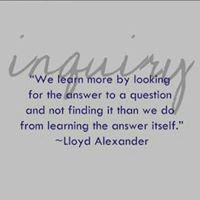It
was easy to find articles, blogs, videos, and more on inquiry based learning
that was of quality and relevance to my focus.
It was more of a case of paring it down from the ample options to view
instead of any absence of information. A
little extra time was required to find information specifically for a broad
overview for school wide inquiry. With
our redesigned curriculum giving room for inquiry based learning, there seems
to be lots of research, examples, and ideas out there to support this style of
learning. There is lots of information
from teachers and learners that have tried the process and seen the positive
results that are sharing their knowledge, so you can feel confident that it is
a tried and true process.
One takeaway
for me is that all fellow lead learners of mine can dive into inquiry at their
comfort level. They can start small and
work in little changes or really dive in.
I also appreciated that innovation and technology were encouraged to be
part of the process and not just for the sake of having technology, but for
building on the learning. Here are my top 5 picks for inquiry based learning for the elementary school level:
 |
| Retrieved from: https://www.amazon.ca/Dive-into-Inquiry-Amplify-Learning/dp/1945167149 |
This facebook site is specific to inquiry based learning. It provides up to date ideas and
quality links
to great resources, which makes it very useful to gather innovative approaches
to inquiry based learning. It has a wide
range of information applicable to elementary inquiry based learning from
videos and images to lesson ideas. There
is a nice variety of ideas and I like the connections with many well-known
experts of inquiry based learning being sited.
The one negative of this resource is with it being a social media site,
you may come across some posts that do not pertain specifically to your
focus. Some of your time can be wasted
scrolling through ideas not of worth to you.
Overall however, the current, diverse and quantity of ideas can provide
lots of inspiration for a lead learner with inquiry based learning. Similar, but excellent as well:
 |
| Retrieved from: https://www.facebook.com/INQUIRYBASEDBEEDIIIE/?ref=py |
- YouTube: What is Inquiry Based Learning
This Youtube video is the perfect quick length at 6 minutes to give a little snippet overview of inquiry based learning. There is an explanation about getting students actively involved in their own learning, asking questions, and evaluating information. This video would work to share with teachers, staff, parents, or students. It is getting older, being published 2014, but it is a simple explanation that helps give an understanding of the process. Its simplicity in video format makes it visually appealing. I appreciate the message at the end of the video, which indicates how there are different levels of inquiry from structured to open, to help vary learning experiences based on the needs of students.
 |
| Retrieved from: https://sharemylesson.com/partner/edutopia |
- Inquiry based Learning for Elementary Teachers by Education Library, UBC
 |
| Retrieved from: http://search.library.ubc.ca/ |
- Dive into Inquiry: Amplify Learning and Empower Student Voice by Trevor MacKenzie
 |
| Retrieved from: https://www.amazon.ca/Dive-into-Inquiry-Amplify-Learning/dp/1945167149 |
There are a few good print options about
inquiry based learning, but Dive into Inquiry is the one that gives a solid
overview of inquiry based learning that is useful at the elementary level. Inspiring Curiosity: The Librarian’s Guide to
Inquiry Based Learning by Colette Cassinelli has some effective step by step,
useful ideas for inquiry based learning but is more for a highschool
setting. MacKenzie is an English
teacher, instructional coach, supporter of innovation and technology, author,
and individual out to support meaningful public education. Dive into Inquiry is not a heavy read which
means it is not overwhelming for someone just getting started. The ideas are relevant and I like the book
because it has examples and quality resources with research to back it up. Anyone can find even a little something new
to try for a bit of a change in their classroom depending on your comfort level. McKenzie gives links to places like his own blog. The book is a good, clear, and engaging read.
References
Benavides, F.,
Dumont, H., & Istance, D. (2008b). The search for innovative learning environments. In F.
Benavides, H. Dumont, & D. Istance (Eds.), Innovating to Learn,
Learning to Innovate (p. 21). Paris: OECD Publishing.
Cassinelli, C. (2018). Inspiring curiosity. ISTE.
Edutopia. (2018). Resources and Downloads to Facilitate
Inquiry-Based Learning | Edutopia. [online] Available at:
https://www.edutopia.org/article/inquiry-based-learning-resources-downloads
[Accessed 30 Sep. 2018].
Facebook.com.
(2018). Inquiry-Based Learning.
[online] Available at: https://www.facebook.com/INQUIRYBASEDBEEDIIIE/?ref=py
[Accessed 30 Sep. 2018].
Facebook.com.
(2018). Inquiry-Based Learning &
Teaching. [online] Available at: https://www.facebook.com/InquiryBased/
[Accessed 30 Sep. 2018].
Library, E. (2017). Inquiry based
learning for elementary teachers
MacKenzie,
T. (2016). Dive into inquiry: Amplify
Learning and Empower Student Learning. EdTechTeam Press.
MacKenzie,
T., MacKenzie, T., MacKenzie, T., MacKenzie, T., MacKenzie, T., MacKenzie, T.,
MacKenzie, T., MacKenzie, T., MacKenzie, T. and MacKenzie, T. (2018). Posts. [online] Trevor MacKenzie. Available
at: https://www.trevormackenzie.com/posts [Accessed 30 Sep. 2018].
YouTube.
(2018). What is Inquiry-Based Learning?.
[online] Available at: https://www.youtube.com/watch?v=u84ZsS6niPc [Accessed 30
Sep. 2018].




